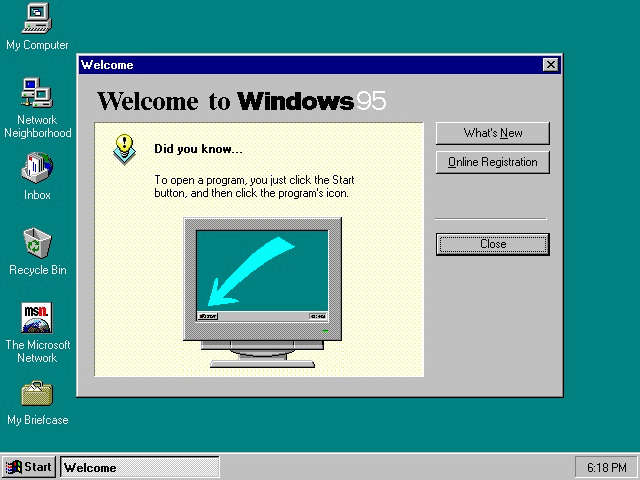| Twenty Years Ago Window 95 Was Released |
| Written by Mike James | |||
| Tuesday, 25 August 2015 | |||
|
As far as personal computing is concerned the release of Windows 95 twenty years ago marked a change from the old ways of doing things to the new. You could say Windows 95 was the first step to 21st century computing. Where were you when Windows 95 hit the shelves?
Yes "shelves" because we were still in the days of boxed software. No downloading and PC stores even opened at midnight to allow people to get the first copies. It might be hard to imagine what computing was like without the Internet (OK it existed but mostly only with dial-up and it was hardly "online"), but the changes that Windows 95 brought about were equally radical and difficult to imagine today. At the time MSDOS and Windows were separate entities. You started your machine using DOS and then you loaded Windows 3.1, which was a simple graphical UI running under DOS. Windows did provide the ability to run more than one application at a time but it was primitive. Before Windows 95 multitasking as cooperative. A Windows program basically ran for as long as it wanted to. To give other programs a chance to run a program had to yield control back to Windows or just make a system call to get something done. If a program crashed then it generally brought the whole system down with it. Put simply programming a Win16 application was no fun. Not only did you have to cope with asynchronous multitasking you had the problem of doing your own memory management. No process could have more than 16Mbytes of memory, but this was a big improvement over the 640Kbytes that DOS had access to. An equally big problem for pre-Windows 95 systems was segmentation. Memory was managed in 64Kbyte segments and you had to manually manage it. With Windows 95 you could access effectively all the memory the machine had and it made use of memory mapping to allow each application to believe it had all the memory to itself. This added to the fact that Windows 95 was a true preemptive multitasking operating system was like an entry to programming Nirvana.
No longer did we have to worry that our program might hog the CPU and cause the user to think that the machine had crashed because it was unresponsive. No longer did we have to worry about running out of memory there was Giga bytes of it - well at least A Giga byte, or almost a whole Giga byte.... Of course it didn't last. We soon ran out of memory and things got slower and needed the rapid increase in processor speed from the 486 to the Pentium and on. Windows 95 brought with it some other big changes - Visual Basic 4 and the start of ActiveX controls. Indeed it was the start of the introduction and use of COM everywhere. Documents were built using COM and ActiveX was a new component technology that even made it into Internet Explorer. ActiveX worked well but it only worked in Internet Explorer - we are still clearing up from that particular mess. Of course there was no .NET and the only alternative to VB4 was C++ and the new class library that Microsoft had introduced for Windows programs - the MFC. So while others are talking about the start button, the Rolling Stones and the amount of money Microsoft spent on the advertising, we can think back to the days when Visual Studio was new, before Windows 95 the Microsoft languages were separate products. We can remember how wonderful it was to have more memory than we could use and could forget segmented memory and cooperative multitasking. But if you really must, then take a look at a video of the launch:
Yes Windows 95 was the start of modern desktop computing.
More InformationRelated ArticlesBill Gates - Before he was famous 30 years ago - Microsoft signs contract with IBM to create MS-DOS
To be informed about new articles on I Programmer, install the I Programmer Toolbar, subscribe to the RSS feed, follow us on, Twitter, Facebook, Google+ or Linkedin, or sign up for our weekly newsletter.
Comments
or email your comment to: comments@i-programmer.info
|
|||
| Last Updated ( Tuesday, 25 August 2015 ) |



